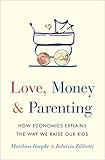Love, Money, and Parenting : How Economics Explains the Way We Raise Our Kids / Fabrizio Zilibotti, Matthias Doepke.
Material type: TextPublisher: Princeton, NJ : Princeton University Press, [2019]Copyright date: ©2019Description: 1 online resource (384 p.)Content type:
TextPublisher: Princeton, NJ : Princeton University Press, [2019]Copyright date: ©2019Description: 1 online resource (384 p.)Content type: - 9780691171517
- 9780691184210
- 649.1 23
- online - DeGruyter
- Issued also in print.
| Item type | Current library | Call number | URL | Status | Notes | Barcode | |
|---|---|---|---|---|---|---|---|
 eBook
eBook
|
Biblioteca "Angelicum" Pont. Univ. S.Tommaso d'Aquino Nuvola online | online - DeGruyter (Browse shelf(Opens below)) | Online access | Not for loan (Accesso limitato) | Accesso per gli utenti autorizzati / Access for authorized users | (dgr)9780691184210 |
Frontmatter -- Contents -- Preface -- INTRODUCTION -- PART ONE: Raising Kids in the Age of Inequality -- CHAPTER ONE: The Economics of Parenting Style -- CHAPTER TWO: The Rise of Helicopter Parents -- CHAPTER THREE: Parenting Styles around the Contemporary World -- CHAPTER FOUR: Inequality, Parenting Style, and Parenting Traps -- PART TWO: Raising Kids throughout History -- CHAPTER FIVE: From Stick to Carrot: The Demise of Authoritarian Parenting -- CHAPTER SIX: Boys versus Girls The Transformation of Gender Roles -- CHAPTER SEVEN: Fertility and Child Labor From Large to Small Families -- CHAPTER EIGHT: Parenting and Class: Aristocratic versus Middle- Class Values -- PART THREE: How Policy Affects the Way We Raise Our Kids -- CHAPTER NINE: The Organization of the School System -- CHAPTER TEN: The Future of Parenting -- Notes -- Index
restricted access online access with authorization star
http://purl.org/coar/access_right/c_16ec
An international and historical look at how parenting choices change in the face of economic inequalityParents everywhere want their children to be happy and do well. Yet how parents seek to achieve this ambition varies enormously. For instance, American and Chinese parents are increasingly authoritative and authoritarian, whereas Scandinavian parents tend to be more permissive. Why? Love, Money, and Parenting investigates how economic forces and growing inequality shape how parents raise their children. From medieval times to the present, and from the United States, the United Kingdom, Germany, Italy, Spain, and Sweden to China and Japan, Matthias Doepke and Fabrizio Zilibotti look at how economic incentives and constraints-such as money, knowledge, and time-influence parenting practices and what is considered good parenting in different countries.Through personal anecdotes and original research, Doepke and Zilibotti show that in countries with increasing economic inequality, such as the United States, parents push harder to ensure their children have a path to security and success. Economics has transformed the hands-off parenting of the 1960s and '70s into a frantic, overscheduled activity. Growing inequality has also resulted in an increasing "parenting gap" between richer and poorer families, raising the disturbing prospect of diminished social mobility and fewer opportunities for children from disadvantaged backgrounds. In nations with less economic inequality, such as Sweden, the stakes are less high, and social mobility is not under threat. Doepke and Zilibotti discuss how investments in early childhood development and the design of education systems factor into the parenting equation, and how economics can help shape policies that will contribute to the ideal of equal opportunity for all.Love, Money, and Parenting presents an engrossing look at the economics of the family in the modern world.
Issued also in print.
Mode of access: Internet via World Wide Web.
In English.
Description based on online resource; title from PDF title page (publisher's Web site, viewed 21. Jun 2021)


